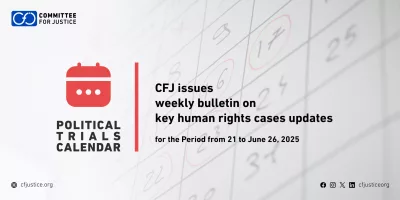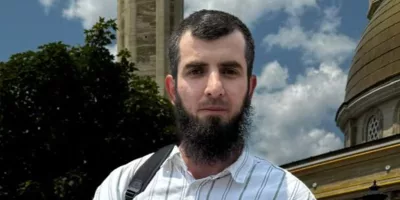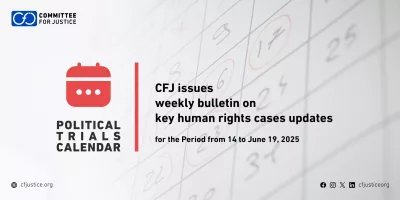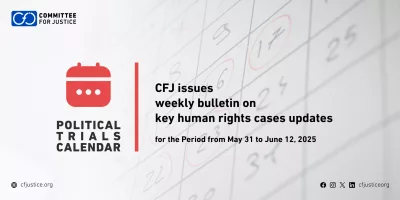Events and violations under case No. 165 of 2017-military as a model
Press release
Geneva, August 2019
“There is no doubt that the respect for human rights and the application of guarantees of fair trial is the higher goal of a developed democratic society that safeguards the rights of citizens, guarantees their equality before the law, protects the state from extremist ideas adopted by terrorist groups, and saves much effort for many countries in combatting terrorism.”
This is the conclusion reached through the report published by ‘Committee for Justice’ and the ‘Egyptian Front for Human Rights’, titled “State terrorism and armed groups terrorism, how does society survive both?”. The report analyzes the incidents and violations that accompanied Case No. ‘165 of 2017-Military felonies, Alexandria’, known in the media as “churches bombing case”. This report is part of a series of reports documenting the systematic violation, by the Egyptian authorities, of fair trial guarantees for defendants, particularly in cases involving political violence.
The report documents, from a human rights perspective, the continued involvement of the Egyptian authorities in violating human rights, tarnishing the rule of law, ignoring judicial procedures – supposedly disciplined by the framework of justice, constitutional and legal principles and international conventions – during investigations and trials. The report warns that this kind of behavior opens the path towards a dangerous horizon, that blocks any attempt to counteract the root causes of terrorism and to holding terrorists accountable in accordance with the proper rule of law, and risks entering into a vicious vengeance cycle.
While the findings of the researchers support the view that the defendants had committed such a crime – through analyzing events and facts and evidence provided by the security apparatus to the judiciary -, nevertheless, we found that despite the ability of the security services to provide sufficient evidence against the defendants to prove their commission of the terrorist crime, the security apparatuses insisted on using torture and enforced disappearance as a systematic mechanism for extracting confessions from the defendants, despite the availability and adequacy of information that make it completely pointless to use such repressive mechanisms and systematic methods that violate human rights.
And despite our explicit condemnation of this unjustified terrorist act, and our unconditional solidarity with the families of the victims in their pain, yet at the same time we reaffirm our rejection of the continued behavior of the Egyptian authorities in violating human rights, which has contributed to the spread of extremism in Egypt, and we also reiterate our total rejection of the adoption of the security strategy, as a sole approach, in dealing with terrorism.
The report presents several incidents that violated the guarantees of a fair trial, which accompanied the proceedings of the case known as the “churches bombing”, which included the enforced disappearance of 23 of the total 33 defendants in custody. It also highlights that the majority of imprisoned defendants were subjected to physical and psychological coercion, that included beating, hanging, stripping of Clothes, electrocution, and threats of retaliation against relatives.
The report’s methodology is based on a holistic approach of analyzing the events and the official case papers from the arrest records, referral papers, and prosecution investigations, going through the testimonies of the defendants’ lawyers and their relatives, and ending with an analysis of the hearings and the final court verdict. The report sheds light on the practices undertaken against the defendants, which amount to being systematic and violate the rights and guarantees of a fair trial in accordance with the law, especially given the fact that trials concluded with a large number of death sentences.
“The report is not meant to prove whether or not the defendants were involved in the crimes they were accused of committing. The main concern of the report is to focus on fair trial guarantees, and whether or not the Egyptian judicial and executive authorities are committed to such procedures, for the given case and otherwise,” said Ahmed Mefreh, the CEO of Committee for Justice.
“The report underscores the importance of achieving justice and respect for human rights as a key approach to tackling all criminal justice matters in Egypt,” said Karim Taha, deputy director of the Egyptian Front for Human Rights.
The report concludes in its recommendations that it is important to stop referring civilians to military courts, as well as the need to refer military cases and cases that are still pending before the military judiciary to the public prosecution or the civil judiciary and to recommence the trial procedures in accordance with the Egyptian penal code, so that defendants can obtain their right to an appropriate legal defense, and to be trialed before a civil judge.
It also stresses on the need for Egyptian military courts to apply internationally recognized standards and procedures as a guarantee of fair trial in all circumstances, and to ensure and guarantee the right to defense and the right to a fair and full trial before military tribunals, with its various degrees, as well as to hold those accused of serious human rights violations accountable for their crimes.
The report emphasizes that military judiciary laws should reflect the international trend towards the gradual abolition of the death penalty, in time of peace and war, and to establish an immediate moratorium on the death penalty with regard to those who have been sentenced to death.






